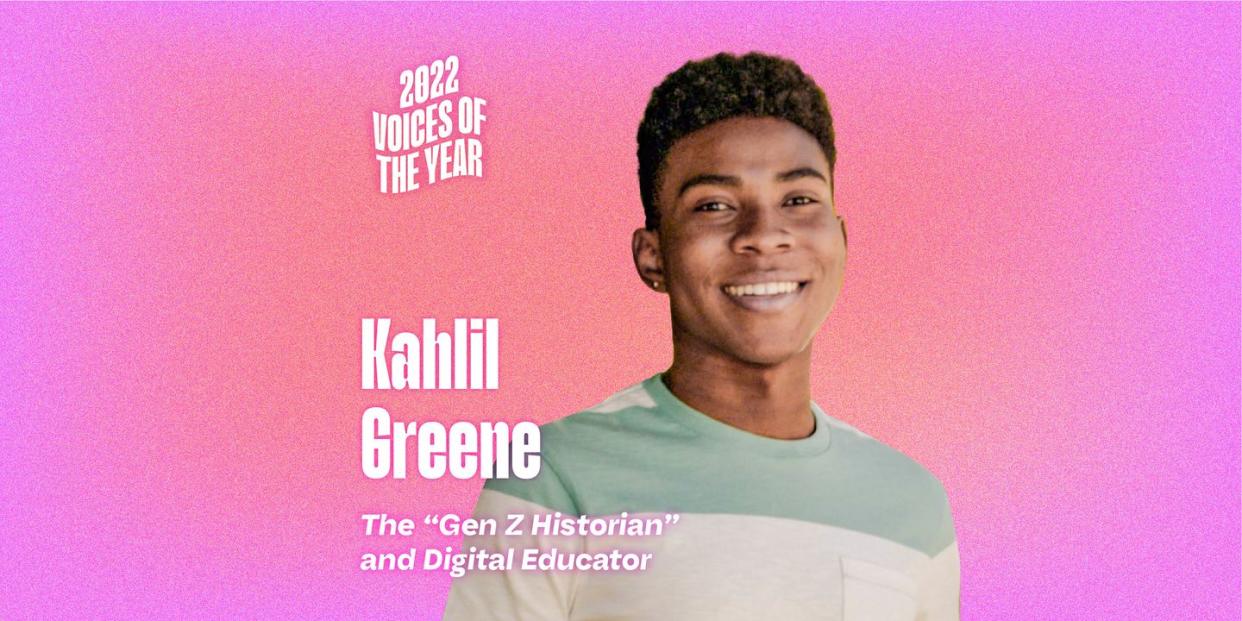Kahlil Greene Explores and Educates on Black History and America’s Injustices as the “Gen Z Historian”

As the “Gen Z Historian” on TikTok, Kahlil Greene educates 581.3K followers on the truth of Black history in the United States and the whitewashing of historical moments, leaders, and their legacies. His TikToks have received a total 8 million likes, and views on certain videos have reached as high as 4.6 million.
Kahlil’s journey as the Gen Z Historian began in January 2021, when he uploaded a TikTok about the whitewashing of Martin Luther King Jr.’s legacy. The clip garnered 1.4 million views and hundreds of thousands of likes, and from there, Kahlil discovered a platform to inform his peers on the realities of lesser-known historical moments and cultural movements. “My TikTok platform has been dedicated to education and truth about the history of marginalized groups and American injustice,” Kahlil, 22, told Seventeen.
A member of his high school’s Black Student Union, engaging in local activism related to Black Lives Matter and the 2015 death of Freddie Gray, Khalil then translated his activism to the Yale University campus. He joined the student government, and in 2019, was elected the first Black student body president at Yale. “I tried to make my voice known in different ways throughout my life,” Khalil shared. “I used my platform to raise awareness around nationwide issues, for example, inequities in the COVID-19 pandemic, the death of George Floyd, police brutality, and affirmative action.”
As he looks toward more content creation, potential movement to different platforms like YouTube and mainstream media, and expanding his teachings into book form, the Gen Z Historian’s goal remains the same: “I just want to try and continue to use my expertise in interesting ways.”
What inspired you to launch your platform as the Gen Z Historian?
Khalil Greene: The conversations happening on TikTok was my motivation. For example, in 2020, there were discussions about the origins of Aunt Jemima syrup that forced the company to change their title to the Pearl Milling Company. There were conversations about how people co-opt Black social movements for their own gain and profit without actually helping the community. Many of those discussions were really enlightening, and I had my own perspective on a few subject matters. My first video went super viral and motivated me to keep going.
What are you most proud of achieving so far?
KG: Those moments and messages where people say that they learned something new. That's my main goal, to inform and enlighten people to think about things in different ways and collect new knowledge that helps inform how they show up in society as citizens and community members.
There was one person who stitched one of my videos and said, ‘This is amazing because I've had all of these ideas but I've just never been able to say them, let alone say them in one minute.’ She felt empowered because many people she knows in the Black community have wanted to be able to communicate certain ideas but to no avail. They said that the way I explained issues made it click for them, and they know it'll click for anyone who watches. Teachers will say they love my videos and will share them with their classes. I work with one teacher who makes educational curriculums for classrooms and he's incorporated my TikToks into his lesson plans.
How have you grown in your activism journey?
KG: How I educate has definitely changed over time. TikTok is a platform for education, but it's also entertainment. I've had to learn how to be captivating and compelling, while also educating, which is a uniquely difficult thing to balance. I'm also now more understanding of the fact that everyone's perspective is informed by their upbringing — someone’s ideology often comes down to how they were raised and not being able to weigh the balance between the deep-rooted beliefs they feel and the harm they cause. I've learned to give people more grace as I'm educating and informing them about these really sensitive topics.
What is a challenge you've faced and what have you learned?
KG: The biggest challenge is managing time and creating content. You have to align your interests in advocacy with the content these platforms want. You have to make it entertaining and consistent. You have to be on top of the news cycle because if the topic is not related to current events, then people probably aren't going to watch it. So it's difficult to do all of these things at once while not having a full team around you. But I've learned how to manage and understand what I can and cannot do, and be okay with not being able to do everything.
What inspires you to keep advocating for others?
I've been in situations where people of all different religious beliefs, countries, and racial groups thrive and enjoy each other's cultures. Unfortunately I feel a lot of those moments are short-lived because after the initial camaraderie, all of these deeper-set social issues come out into play. If these social issues were alleviated, then we would have a lot more room to connect with other individuals, regardless of where we come from. I’m not just looking for everyone to be interconnected and in communion with each other — I want these social issues to be out of the way. The first step in getting people to be aware of how social issues play out is to educate them. I'm inspired to educate people so that we can all come together.
Parts of this interview have been edited and condensed for clarity.
Photo Credit: Laurie Valentina Gomez Acosta; TanTan Wang. Design by Yoora Kim.
You Might Also Like
